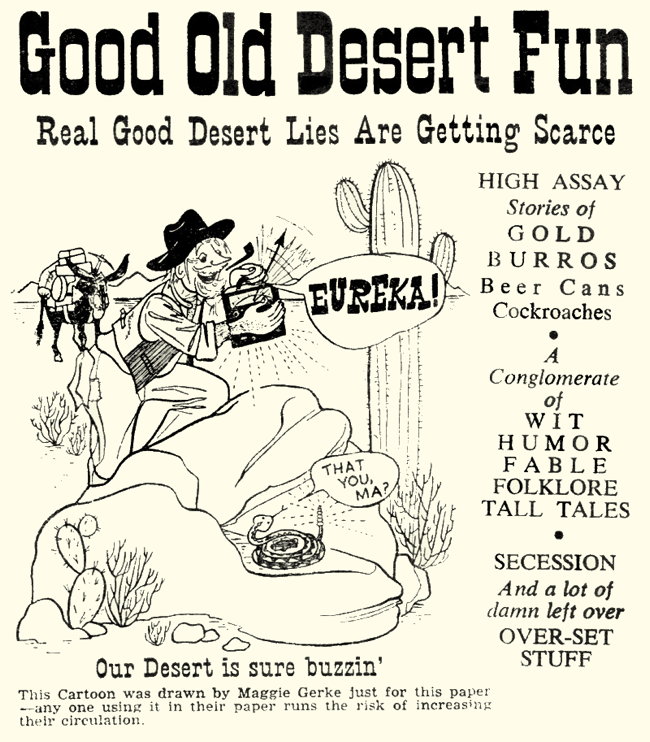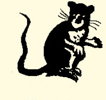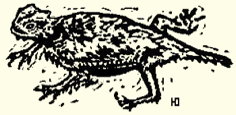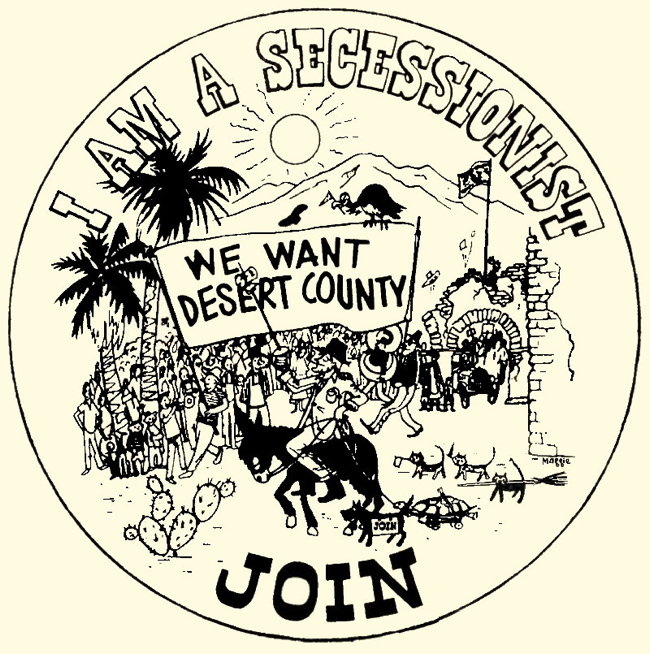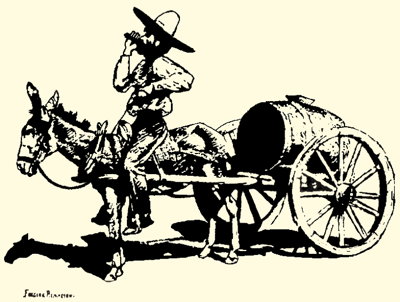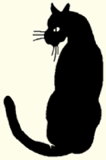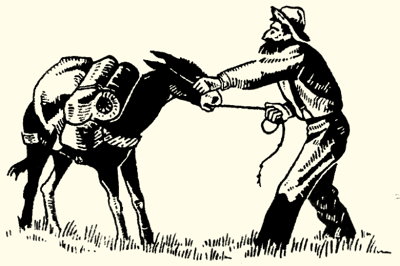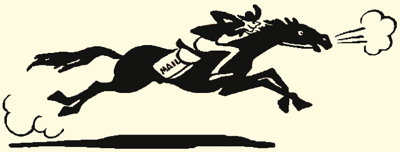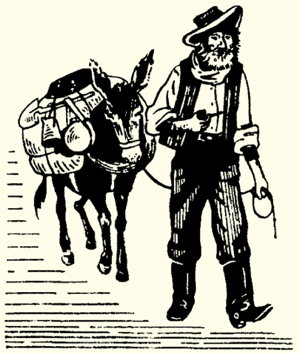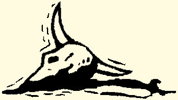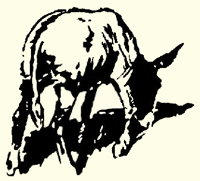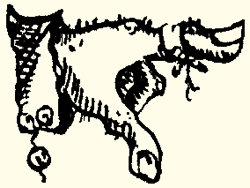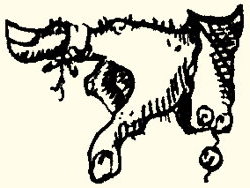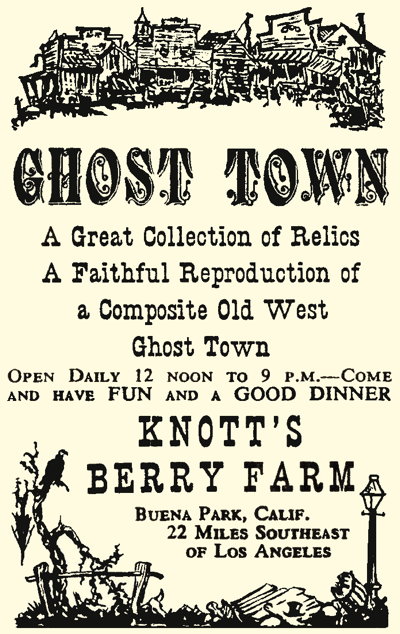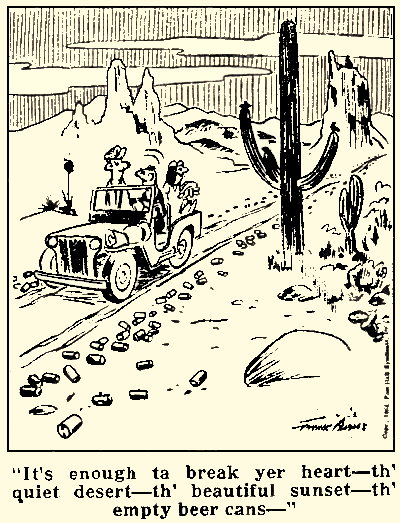BACK HOME COVER THIS IS HISTORICAL INFORMATION ONLY
PRICE 10 CENTS . . . . . . . ONLY ONE LOUSY THIN DIME
PACKET TWO OF POUCH SEVEN
YES, AND NO, AND MEBBE, AND MEBBE NOT
PUBLISHED FOUR TIMES A YEAR
ONLY NEWSPAPER IN AMERICA YOU CAN OPEN IN THE WIND
Genius ain't anything more than elegant common sense.
Page 2
Josh Billings
Smallest newspaper in the world and the only 5 page one.
Packet 2 of Pouch 7
![]()
This paper is not entered as 2nd class mail. It's a first class newspaper.
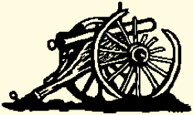
I cannot afford to waste my time making money.
![]()
It pays to be nuts—if you use good taste.—H.O.
![]()
The style is the man himself.
![]()
I find when I tell lies, folks don't care just so I am sincere—H.O.
![]()
What is history but a fable agreed upon?
![]()
What a feller makes up is sometimes better than what really is.—H.O.
THE HORNY TOAD
The horny toad, ill graced but harmless
Is thought by some to be quite charmless.
At least he helps eat garden ants—
And does not try to crawl up you pants.
From S. Omar Barker's new book Songs of the Saddlemen.
JUST FOR FUN
For the last 8 years I have given you this little paper just for the hell-of-it, I have kept it on the happy side: But while doing this I have taken on numerous other projects, some national in scale. This does not mean I wish to be noble, (It is just a sneaky way I have of getting free advertising).
"Scoop" the Roadrunner, my star reporter hopped on the back of my chair—I waited expecting to be told off — but to my surprise "Scoop" was in a mood to hand me praise—(rarely does one of my staff give with praise). "The brilliance you used when you called this paper a Scrap Book was sure a stroke of genius."
"Why yes" I answered.
"You know," Scoop continued, "your Staff could keep this paper going without you. Here is some stuff I found and as one of your staff I wish you had written, as it sure fits our simple little paper and our way of thinking."
As "Scoop" thinks I think
I have heard lies so well told that a man would almost be a fool not to believe them.
* * *
Even the truth has a ridiculous side to it, and he who can make us laugh at it is the best philosopher.
* * *
The art of becoming important is not to overrate ourselves but to cause others to do it.
—Josh Billings, From the book "Uncle Sam's Uncle Josh," by Donal Day
SCOTTY'S CASTLE
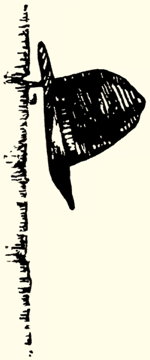
It's a mad dream come true in a desolate canyon over a hundred miles from a railroad or town—in Death Valley, the hottest, driest spot in America.
Out of these scorched mountains, squeezed by the weight of them, leaks a little magic brook of water — here Scotty dreamed of a Castle—and said to himself, "This is the place,"—here where it was so still—why that whisper sounded so loud it just had to be.
To me Scotty was a Barnum, Munchausen, Don Quixote and Rip van Winkle all in one. 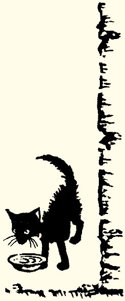 Today you can visit this Castle and you will find (as I did) that Scotty is there — everywhere — you can walk right into his dreams—the good folks at the Castle know all this — his dogs do too—and a sweet lady dweller—after I had looked at a new batch of kittens — told me — this for sure — that Scotty loved the little strangely spotted one — and you know somehow I was sure of it.
Today you can visit this Castle and you will find (as I did) that Scotty is there — everywhere — you can walk right into his dreams—the good folks at the Castle know all this — his dogs do too—and a sweet lady dweller—after I had looked at a new batch of kittens — told me — this for sure — that Scotty loved the little strangely spotted one — and you know somehow I was sure of it.
Your Editor hopes some day to sleep the night in Scotty's bed—to look up at the pictures of Buffalo Bill, Pawnee Bill, Annie Oakley and Will Rogers, then put his head on Scotty's pillow and try to redream some of the old Showman's Million Dollar Dreams.
Any redblooded man in the West can tell you how to get to Death Valley — yes they have accommodations at SCOTTY'S CASTLE year round.
BUFFALO CHIPS
Desert Enthusiast believes about four times as much as he can prove and can prove about four times as much as anybody else believes. He never exaggerates—he just remembers big.
* * *
The 1954 crop of good Desert lies is about 2763 short of 1953.
![]()
 With me giving my cats all those fancy names, Whiskers my dog got to complaining about his name.
With me giving my cats all those fancy names, Whiskers my dog got to complaining about his name.
Nine years ago Dry Camp Blackie gave him to me because as a puppy he had white whiskers just about like mine.
He should be proud I am.
But since the Democrats got back in, the Animals have all been restless, asking for this or that. Raffles the Pack Rat has asked that I build an Attic here at Fort Oliver. He says, pack rats can't do a good job of their midnight magic without a good "sounding" attic.
![]()
Tomato Juice & Skunks
An effective way to deodorize a dog that has been sprayed by a skunk is to scrub the animal in a basin containing three of four cans of tomato juice, depending on the size of the dog. The juice absorbs the odor and can then be washed out with soap and water.
—Tonopah Times-Bonanza
New Model Cockroaches
A friend in Berkeley has juste sent me six radioactive phosphorus spayed Cockroaches. Thus treated makes them traceable with my geiger counter and easy to see at night. "Craziest bugs I ever lived with,"—they're up on the roof—I put my geiger counter up there so I can sleep—they ride on it—run around it and keep it ticking all night long.
Which reminds me of a story by Evan Esar that will never get old.
A doctor approached a patient in a mental institution, slapped him on the back, and said: "Well, old man, you're all right. You can run along and write your folks that you'll be back home in two weeks as good as new."
Delighted with the news, the patient sat down to write his letter. He finished it and sealed it, but when he was licking the stamp it slipped though his fingers to the floor, lighted on the back of a passing cockroach, and stuck. The patient hadn't seen the cockroach. What he did see was his escaped postage stamp zigzagging aimlessly across the floor to the wall, following a crooked track up the wall, and then disappearing though a crack in the ceiling. In depressed silence he tore up the letter that he had just written, and said:
"Two weeks! Hell! I won't be out of here in two years."
Your editor just wonders if there is some kind of a connection with the gift of these six cockroaches to me and the story above.
Good Nonsense Is Good Sense In Disguise
Page 3
Josh Billings
SHAME--Look What YOU Did!
Your Editor pointed a finger of Shame at roadside "Junk-Tossers" this winter. Pictures went out over the (United Press) to every State in the Uniion, clippings came in fro Alaska, Canada, Mexico, and one from Okinawa.
To Quote The Los Angeles "TIMES"—Oliver who can find humor in anything, including roadside debris, penned these nuggets:
"The highway between here and Wickenburg is beautiful this time of the year. All the Kleenex bushes are in full bloom, right alongside the road."
Another quotation from his Scrapbook:
"The wildflowers at Fort Oliver were so thick this Spring you could hardly see the discarded beer cans."
Bert Fireman of "The Phoenix Gazette," said, on joining the crusade "It seems that litterbugs pick the prettiest spots, under the little shade provided on the desert—to do their dirty work."
L. Burr Belden of the San Bernardino "SUN" told this:
It seems Oliver started printing those "Shame" signs on his 90-year-old Washington hand press. Ole Nordland of the Indio Date Palm seconded the crusade and took over the sign-printing business.
Bob Hirt of the Riverside "Enterprise" added the Desert Leprechauns. I give you Bob's whole story (all but the pictures of me putting up the SHAME signs) in the 8 years I have printed this paper I have never had my picture in it. (But I sure do get it into the other papers.)
By BOB HIRT
THOUSAND PALMS, Nov 23—The one-man Chamber of Commerce in charge of mostly Riverside County's deserts, which cover a little more area than other Chambers of Commerce in these parts, was up in arms this week about the sloppy city slickers who drive through his territory and leave tokens of their presence behind.
Desert Chamber president Harry Oliver, more often known as the Desert Rat than Harry Oliver, referred the matter to the Desert Beautification Committee, which is headed by Harry Oliver.
Action
The president was forced into action by the board of directors, which is mostly made up of The Desert Rat, someties referred to as Harry Oliver.
In a formal declaration, Oliver of the board said to Oliver the president who relayed to Oliver the committee chairman:
Simplicity
"In the desert we have a simplicity and cleanliness you cannot find anywhere else in the world.
"Our dirt is not dirty — just clean sand — no smelly swamps — no sewer carrying rivers—no smoke or smog.
"But woe, we have distress and the desert Leprechauns who sweep our desert each night with their feathery brooms can't cover those . . . confounded beer cans.
"Due to our cleanliness, beer cans look worse in the desert than anywhere."
Oliver, the committee chairman, who wouldn't spek for his superiors, issued a statement from Oliver the president explaining the desert Leperchauns design patterns on the sand dunes.
Oliver of the board, not to be out done by Oliver the president, chimed in that "it's a big desert and you wouldn't think little people could mess it up."
With this classic still ringing in his hears, Oliver the beautification chairman, plunged into a man-sized job of posting signs around the desert reminding beer-drinkers to keep their beer cans in the city and off the clean desert sands.
The signs can't be mistaken for the ones that tell you to ride the train next time.
They bluntly say: "Shame . . . Look What You Did . . . (Beauty was here until you came!)."
Everywhere
Oliver hasn't posted these signs just anywhere. He posted them everywhere there is a pile of beer cans, which won his special commendation from Oliver the president.
This spurred Oliver the committee chairman on to even greater things.
He attached a second sign to the bottoms of the first ones which says (in fine print): "We love our desert—Please keep it beautiful."
This won him special commendation from the bottle makers who still believe the best drinks come in bottles anyway.
PUSHED BY
Somebody bigger than I
DURANGO, Colo. (AP)—Driving along the highway south of here, Lena Maude Carson started to throw a popcorn sack out of the car window.
The auto went out of control, ran off the shoulder, rolled over twice and landed on its top in a lumberyard.
Mrs. Carson was unhurt, the State Patrol said.
Two New Chapters In The Life Of A Professional Old Timer
After cleaning the tin cans out of the desert, Harry is ready to slice Riverside County—"right smack in the Cabazon"
This "Professional Old Timer" eponym was graciously bestowed on me by Lucius Beebe
By BOB ZIMMERMAN
In the Riverside Enterprise
THOUSAND PALMS, Jan. 15—"Those dern tourists" are ruining his Desert County secession campaign, desert rat Harry Oliver charged today.
Mad as an ambidextrous sidewinder trying to travel a crooked line Harry left his campaign against tin cans and charged back into the fight to cut up Riverside Country with a barrage of buttons.
The buttons proclaim—"I Am a Secessionist"—We Want Desert County"—"Join"—and are modestly illustrated with a picture of Oliver on a Burro.
The trouble is, Harry complained, the tourists are picking up all the buttons in sight for souvenirs.
Harry, who recently was disqualified from taking part in the annual Peg-Leg Smith Liars Contest on the ground that he was a professional liar, claims to have been the one who started the idea of the desert's withdrawing from Riverside County and forming its own county.
The Name Did It
It was back in 1946, he said, when he first became ashamed of Riverside because the name is the most unimaginative name in America.
"It made me mad and it made me a little ashamed of my address," the unbarbered don quixote shouted.
Since then he has let it be known that his address is "Old Fort Oliver, Desert of the Salton Sink."
And what's more, the sun-baked sultan of the Salton complained, the desert got cold decked when they called it Colorado. The desert had the name first, before that State came along and stole the title.
Drywashside County
"Now San Bernardino had it lucky, with a good Spanish name for the county and a fine Indian name, Mojave, for the desert."
"Why this county could just as well be called Drywashside County," the plundit of the palms proclaimed.
"Desert growers boast of their desert grapefruit. There ain't no other dates but desert dates and nobody has a resort down here that isn't called a desert resort."
"So why shouldn't we throw out Riverside and be just plain Desert?"
Give it back to the MUSKRATS," or to the Midwest—quoting L. Burr Belden of the San Bernardino "SUN."
The old desert rat calmed down for a minute and admitted that maybe a few other people had latched onto his idea of Desert County—"taxpayers and people with serious thought of the future" and folks of that type.
But Harry wants to conduct his own "secesh" campaign his own way. That is if he can keep from losing his buttons.
* * *
A SIGN OF SUCCESS—A rumor has come to me that the "Riverside Enterprise" newspaper will soon drop the Riverside on the masthead of their Desert edition.
Shack, Shanty & Cabin
By "Comfort Expert" Bob Jest
• • •
Bob says the way to make coffee is take one pint of coffee, one pint of water, boil, and drink straight.
• • •
In building a shack, put your open fireplace in the corner—so's when you burn long logs, the logs will lay along the wall and you won't stumble over them—saves a lot of woodcutting.
• • •
Remember you can't fall out of bed if you sleep on the floor.
• • •
If you place a jar lid in the bottom of your double boiler, it will rattle when the water is about boiled away, better than stinking up the shanty.
• • •
If the shack is small, "Familiarity breeds Contempt" — this applies to people only — not to hot buckwheat cakes well buttered and maple sugared.
• • •
Never speak loudly to one another unless the shanty is on fire.
• • •
Must add this one by John Weld of the Laguna Beach Post.
How to tell what kind of a person you are: If from a bowl of pretzels you pick only the broken pieces you are like me, God forbid.
30 YEARS AGO
In good old Bisbee, Arizona, from the Brewery Gulch Gazette.
Last night a couple of residents of Youngblood Hill and their burro were picked up on OK street by night police sergeant Wally Jones. The panniers on the burro were loaded with a transparent liquid which turned out to be "corn squeezings."
"Well, fella, I guess you got us," said one of the moonshiners.
Is this really good stuff?" asked the policeman.
"Sure is. I just came here from Kentucky and I've been making it for years back there in the hills, and I know how to make it. Nothing but the best that my dad and I turned out there. What are you going to do with us?"
If it really is good," said the law man, "I'd like to get a gallon of it. How much do you want for it?"
This reporter never did hear what kind of deal was made, but it was probably satisfactory to both parties.
GOLD
The old desert prospectors who search the desert sands for gold want only the fun of finding it, not what gold will bring them—but it's strange how much they know of gold. I was given this to read by an oldtimer here today. Since 1492, the year Columbus discovered America, the total amount of gold produced in the whole world ha been twenty-two billions and a half. But today, in gold money and gold bullion, there are only twelve billions of this vast amount accounted for. Where is the rest, the vanished ten billions? Much of it has gone into industry. Millions of it have gone into gold jewelry. Fortunes in gold leaf have been laid in the crosses and domes of churches, cathedrals and mosques.
Gold is restless and everlastingly seeks a change. It changes its form and place, and yet endures. For even the gold setting of a woman's bracelet or the gold in a man's watch may once have glittered from the walls of Solomon's temple, or shone on the shaven heads of the priests of Isis in old Egypt, or have been snatched from some burning city of the Spanish Main to the tragic accompaniment of the shrieks of dying men and the screams of captured women.
![]()
Researchers are still interested in whether teetotalers live longer than elbow-benders, or whether it merely seems longer.
—Tonopah Times-Bonanza
Injun Stuff
Sitting Bull stood up by Palm Springs Editor
Race Horse Harrison well known character about town, told me the other day how he got his nickname. A member of the Chippewa tribe of Indians, he was originally named Running Horse. But after he had been here a while, friends changed that to Race Horse. Same thing. Pat Stanbaugh of the Dunes said that Race Horse is the only Indian with an electric blanket. And that every time Race Horse snaps on the switch, on a cool night, Sitting Bull turns over in his grave. "Fact is I think he stands up," says, Phat Graettinger — himself a sitter of some renown.
TUMBLEWEEDS
It's a sad case.
What is?
Twenty-four empties.
—Okla. Covered Wagon
![]()
SHEAR WHIMSY
By Kerwin Hoover, KFI
And from the Charles City (Iowa) Press comes this cultural social note: the old section of the city known as Billy Goat Hill has been converted into a swanky residential subdivision called Angora Heights.
![]()
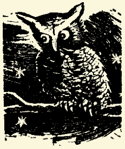
An owl, after primping for a call on his lady friend, stepped out of his nest, only to find rain pouring down. He climbed back, perched on a high limb and murmured sadly, "Too wet to woo."
![]()
I find truth is hard to sell, while lies sell like hot cakes.
![]()
Ed Ritter Riverside newspaperman says, "I may not always be funny but my Desertratsmanship is above reproach." Such talk is good when you are in the Hermit Business.
![]()
Children and Animals have neither past nor future; and that which seldom happens to us, they rejoice in the present.
—La Bruyers
![]()
Spontaneous Cats—I am housekeeper for five fat cats—crazy cats—Kittens one day — Mothers the next — all but the He's.
![]()
"Sin" sings soprano and she and all the other cats in this end of the valley often make the night atmosphere melodious with their opera music. But "Sin" don't like soprano's on the Radio—fact she likes, at this time a popular song "Dont Let the Kitty Get In"—she listens with a smug smile on her face—you see I chopped a hole in the adobe wall so she and all her family and friends can come in at any time. We have an understanding — she's not to have that skunk in again, or I will plaster up the hole.
4 Half Ass Edition
This page is dedicated to the World's Greatest Optimist--the Desert Prospector
BRAYING
Q. How can you stop a burro from braying?
A. I've read that if you take an old shot bag and fill it full of sand—then tie it to the burro's tail he can't bray, as a burro must lift its tail to give forth with a powerful hee-haw. This way all you get is a fizzled-out, half finished yawn of a bray. But be that as it may, I doubt very much if you can stop a burro from braying. Why stop them? It's just their way of talking—you can beat them to the bray by feeding them on time, and keeping them from being lonesome.
Before The Jeep, They Tried To Replace The Burro
from the Wickenburg News-Herald, 1903, as reprinted in Joseph Miller's book, Arizona Story, Hastings House, 1952
"Harrisburg was the scene of quite a sensation Sunday when Frank Midlon, who has been prospecting on the Harqua Hala and Harcuvar Mountains for the past two years, came in to town for provisions, as he is in the habit of doing every three months. But instead of bringing his five pack burros as usual, Mr. Midlon came sauntering into town leading a monster terrapin, the same dry land tortoise as you have around Wickenburg, only much larger.
"According to Mr. Midlon, the terrapin, which he calls Jumbo, weighs about 450 pounds and can pack from 1200 to 1500 pounds, depending upon the roughness of the country. Three of Mr. Midlon's burros died last winter on account of lack of feed and water near his camp and the other two wandered off, leaving him up against it, as he had to pack his camp water eight miles to where he is working in the Harcuvar Mountains. Not wishing to make the long trip here after new burros, he finally decided to try a terrapin, and now says he would not trade Jumbo for a dozen burros. Two holes have been bored in the edge of the upper shell on each side, enabling a pack to be securely tied on. After spending Sunday morning packing some of the boys around town just to show what Jumbo could do, Mr. Midlon left that afternoon for the Socorro Mine to have Jumbo shod by blacksmith Ed. Towner.
"He returned yesterday afternoon, bearing evidence of Towner's skill in the shape of four sole leather shoes, stuffed with hob nails. Mr. Midlon loaded up with his usual supply of grub, amounting to over 700 pounds; and after securing it tightly with the ordinary diamond hitch, started back to camp yesterday afternoon, Jumbo apparently not noticing the load of 700 pounds any more than the empty pack saddle.
"The distance to Mr. Midlon's camp is about 35 miles, and he says he can make the trip loaded in about five days' easy traveling. If the supply of terrapins lasts, there will be no further use for burros in this section, as the terrapins can go without water for two months or more without suffering any inconvenience, and a little hay or greasewood once a month is an ample supply of food. Mr. Midlon said he had no trouble at all in breaking Jumbo and that when he camps at night he simply ties both legs on one side together, so that if he tries to get away, he walks around in a circle and makes no progress."
![]()
Women are wiser than men because they know less and understand more.
![]()
In the United States there is more space where nobody is than where anybody is.
This is what makes America what it is.
—Gertrude Stein
This is a good quotation to remember if 60 miles from Goldfield with a flat tire — says Maggie Gerke.
MAÑANA
Mañana is a Spanish word we all would like to borrow.
It means: "Don't skeen no wolfs today wheech you don't shot tomorrow.
An' eef you got some jobs to did, of wheech you do not wanna,
Go 'head an' take siesta now! Tomorrow ees Mañana!
—S. Omar Barker, in Songs of the Saddlemen.
LETTER TO THE EDITOR
Just finished your "Jackass" edition. Good, but not complete.
In several articles appearing in the packet the burro was accused of being independent, balky and of a sullen disposition. This just isn't so.
Granted, the burro clop-clips along, (did you ever notice that only a burro makes that particular sound), paying little or no attention to anything else. But, this is not because of any idea he may have of his own importance—it is because the burro is the only creature on God's earth which has already fulfilled its destiny. He completed his mission 1954 years ago this Christmas Eve.
It was the long-eared, clop-clipping burro that carried Mary from Nazareth to Bethlehem that fateful night. He was one of the first to see the Christ Child after he was born in the stable. He saw the three wise men pay homage to the Child—what more is there for him.
I am indebted to Bing Crosby for this information. For many years at Christmas time, "Der Bingle" would narrate this wonderful story — "The Small One" by Charles Tazewell.
Now you know why I say you don't know as much about burros as you may think. Glad to have had a part in your education. You have played a big part in mine.
ALICE LONG
Indio News
![]()
Out on the Mojave Desert, at the foot of the Bullion Mountains, we have camped for the night. Supper has been cooked and eaten; now the blackened coffee pot simmers at the edge of our little camp fire. Dusty, my dog, is busy looking for a lizard watching him from the other side of a mesquite bush. In the distance I hear the call of a quail settling for the knight. A rabbit peeps at us out of the sage.
Now the sun has dropped beyond the San Bernardino range, leaving a gorgeous array of colors in the sky. Soon these fade away and it is black night. The big bright stars appear one by one. Somewhere a coyote calls and another answers. Dusty creeps over and snuggles close to me.
Nearby is the rhythmic sound of Cookie, my burro, crunching mesquite or screw beans. Cookie lives and grows fat on the dry vegetation of the desert. Requiring little water, she plods all day, carrying our food and camp equipment. When the sand grows too hot for Dusty's feet, Cookie does not object to the added burden of a little dog. Even if I, too, should be tired, she never complains if I ride on her back.
Does any animal possess more patience and understanding than a burro? Did not our Lord Jesus choose this slow-moving, patient, lowly animal to ride upon? He could just as well have had any other manner of steed, but He chose a little burro.
Even to this day you will see the mark of the Savior's cross upon the burro's back. This mark sets it apart from all other animals. And as I sit here beside my campfire, with the soft radiance of the stars shining down, Dusty asleep beside me, and the gentle sound of Cookie munching her food, I wonder to myself: Why cannot man be more patient and satisfied with a little less, or with some of the more simple things of this earth?
Could he not live longer and just as well, or better, if he would learn to move more slowly, more carefully? Would he not learn to see more of Nature's beauty, the things in life that are worth while?
If the old saying "Patience is a virtue" is true, a burro must be very virtuous.
Well anyway, five years ago I was given sixty days to live, but since then I have followed the example of Cookie. I tramp in the healthful rays of the sun by day, sleep on the sand under the stars, eat simple, plain food, move slowly, try to see good in everyone and everything. Above all, Cookie has taught me patience. So instead of only sixty days to live, Dusty and Cookie and I expect to go on and on down that long, long trail together, just moving slowly along being patient until we reach that Big Gate somewhere at the rainbow's end.
—W. A. (Pappy) Goldschmidt
Golden Legends of a Fabulous Land
LOST MINES
OF DEATH VALLEY
By Harold O WeightJUST OFF THE PRESS - $1.50
72 Pages—Many Illustrations
Two-Page Map of the
Death Valley CountryBy Norton Allen
Order from
CALICO PRESS
Twentynine Palms, California
DEATH VALLEY STORIES
BY CAPT. R. A. GIBSON
In 1905, Tommy Williams, a Welshman, and Mule Skinner, was driving a 10 mule string from Las Vegas to Beatty, I being the Swamper asked Tommy if he could accompany us to Beatty (Bullfrog District) which was then on the Boom. Tommy said "sure, throw your bed roll aboard and crawl aboard yourself. This fellow was very good company in the evening after the meal was over and teams cared for, so we really enjoyed having him along—his travels all over the world, and his many experiences kept us enthralled. When we were crossing the wash at Ash Meadows just after a very slight rain, the team got a bit off the road and down went the lead wagon to the axles meaning we had to discharge, snake it out to hardpan, haul the cargo with the trailer and reload. Tommy knew how to cuss better than any sheepherder and on this occasion, looked up into the sky and said "Lord you sent this dam' rain to get me into trouble dang your hide—now help me get out dang you to the devil.
Out of the heavens seemingly came a hollow voice saying "You call yourself a Skinner—let the kid (Me) drive—he'll mind that the teams stay on the road—who told you how to skin mules anyway?" Tommy was astride the wheel mule—glared at me—at the passenger—whom, when Tommy turned away, winked at me and without any visible movement of the lips, said "now get the cargo out of the wagon—dig out and don't ever dare to cuss me again." Tom was visibly shaken and while I accompanied him on several trips to the Providence Mts. and Death Valley, I never heard him take the Lord's name in vain again—nor did he ever mention the affair. Guess he never knew he had an Edgar Bergen for a passenger.
How many of you good people knew this old valley in the early 1900's.
Well I presume few remember that at the Old Harmony Mill, off the road to the right, a few miles north of here, there once stood the largest OLLA ever constructed. As I recall it, it must have been about 10 feet tall and about 10 feet in diameter at the middle. Around this were steps and these led up to a platform atop this olla. On the platform stood an old cistern pump and a large can to prime the pump and to drink from.
Even in the hottest weather, the water in this Olla, because of the very rapid evaporation, was Icy Cold and tasted very good. This Olla was made from a special clay brought from Ash Meadows and was manufactured by a Specialist brought from Mexico. Returning here in 1941 on a visit from Brazil, I missed the Olla an asked Johnny Mills (then manager of the Furnace Creek Ranch—many of you knew him during his last years when he was at the Inn) what became of the famous Olla. He replied that some dang tourist took a stone to test the strength of the olla and that if fell to pieces. A great loss to Death Valley and to the old timers who used to go up there just to drink this cold water.
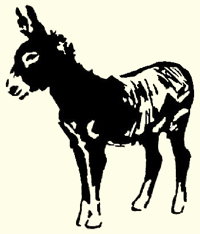 I KILLED A BURRO
I KILLED A BURRO
BY: ANONYMOUS AS TOLD TO
CHAS. LOCKWOOD
Yes—I killed a burro! Let me tell you about it.
My initials are T. R. One afternoon a friend invited me over. He said he was getting ready to go out on the desert and hunt burros and he thought I could help him pack. Now I had never hunted anything in my life—let alone burros. I really didn't know much about them, except that they lived on the desert, but this invitation immediately aroused my curiosity, and so a few minutes later found me at my neighbor's doorstep. A touch of the bell brought H. M. on the run.
He was happy: "This is one opportunity that I wait for," he excitedly exclaimed, "a chance to get out on the desert and shoot burros—man-o-man—it's great sport."
I couldn't understand his enthusiasm—a mere hunting trip and he, like a boy with a new bicycle, was so jubilant. Anyhow, I put about helping him with his duffle, blankets, food, etc., and making ready to stow it in the car. All of the time he was telling me about his previous trips with high-colored adjectives. It sounded fascinating and I warmed to the idea. I began to understand why he had such a great anticipation. To see a burro, as he told it, slowly ambling down a slope or contentedly browsing on the meager food of the desert—then—BANG!—and if you are any kind of a shot at all, you've made your kill! Yes it sounded thrilling.
We had most of the things in order and were placing them in the car, when H. M. suddenly turned to me and said, "T. R. why don't you come along? I'm going alone this time and that's one of the reasons I alled you over. You know I have a shack out on the desert, and I have an extra rifle—you won't need a thing—some on—you'll have a great time hunting!"
The spirited stories he had been telling me about these hunting trips, had ignited a spark in my ego. I guess it was a dormant instinct to kill. I found myself wanting to see the scenes in real life. As I said, I'd never been hunting, but on my infrequent trips to the rifle range, with friends, I had always been a pretty good shot and I thought I could do justice to anything even as little as a burro. On the other hand, however, I was never much enthused about killing things—not even a spider—so my answer was slightly hesitant, "Oh, I don't know whether I should go or not," I returned, "I'd kind of like to go but—but—"
"COME ON! COME ON!" he said in an encouraging voice, "I've got everything we need—go get your jacket, and we'll shove off."
The spark in my mind, kindled into a flame—it sure must be great sport—why not go? In my next breath, I accepted the invitation and in less time than it takes to tell it, I was home, had a jacket and hat, told the folks where I was going, and was back. H. M. was delighted and as we actively hopped into the car, he cheerfully shouted, from the opposite side, "You'll get a big kick out of hunting burros—you'll want to go every chance you get."
We weaved our way through the heavy Los Angeles traffic and on to Huntington Boulevard. We reached the tie-in road at Santa Anita and continued on towards San Bernardino. H. M. kept up a steady stream of conversation and I asked questions intermittently. He had a good command of English and painted vivid pictures of the kills he had made—"but," he carried on, "some hunters try to kill themselves instead of the game—why I've known fellows that—"
We had now passed San Bernardino and were headed into the desert, when I cut into H. M.'s conversation: "How's that?" I asked, "Do they take pot shots at each other like deer hunters?"
He laughed, "Well—some of them," he said, "even do that. But that's not what I mean. What I'm trying to say is, that they get out on the desert and hike all over the country, looking for burros and when they finally kill one, it takes them a week to get back—of course that's an exaggeration—but you know what I mean"
"Yes, I do," I acknowledged, "I an see the point."
Then he continued: "Now the way to hunt burros, is to get around a water hole some place and wait 'til they come in to drink—then you can get them easily. There's a water hole about three-quarters of a mile from my place and that's where we'll do our hunting. All you'll have to do is get on one of the little hills that surround the spot and just sit there—pretty soon they'll show up."
It all sounded thrilling in words. No wonder some people were crazy about hunting the burro.
After we had gone some distane into the arid country, and by turning off the main highway onto a desert path, we reached his cabin. Soon our equipment found itself unloaded and on the inside. We had brought some fire wood and a log or two with us. This was a good thing, too, for it was about the season that the Northwinds surge over the desert and the evenings are nippy and the nights are cold. It was late afternoon now and after we had cooked a fine outdoorsman's dinner, we packed our pipes and sat before the open blaze, talking about the thrills of hunting. We would go out in the morning.
Before daybreak we were up and had our breakfast. When we had finished we checked our guns to see that they were loaded. It was still quite dark so an electric torch picked our way towards the water hole. We eagerly reached the rolling hills around it. Pointing up to a 40 or 50 foot rise of ground, H. M. said, "Make you way up that hill and sit right on the ridge. I'll go around to a hill on the other side, and remember now, don't go walking off into the desert, just sit there until a burro show up, then bang away at him. I'll come back in an hour or so." At this he left for his position, and I started for the ridge. Presently I reached the point and sat down.
My blood was tingling. I waited eagerly. This was a thrill indeed. I looked carefully and with enthusiasm at the space around me. But in spite of this, I was thinking—it had always been my impression, that to hunt game, one had to conceal himself behind trees or rocks, or at least make his presence as little know as possible, and get the game when it was unaware of the hunter's whereabouts. But here I was, in plain view of anybody or anything that wanted to look my way. The burro must be a decidedly different kind of animal, to innocently and without fear, walk right up to a spot where a man was waiting with a gun to kill him. Yes, decidedly different, he must not be afraid of man! But this didn't occupy my thoughts for long because I was intent on getting one of the beasts.
The morning was an ingenious work of God. Peaceful, quiet and colorful as only a desert morning can be. My ego was inflated as I looked upon the scene. And just as the Sun peeped over the distant hills, a fascinating sight reflected in my eyes. He must have been bedded down nearby, for over a small rise stepped a little, mouse-colored burro—unafraid and with the innocence of a child — he slowly ambled toward the water hole. It was a picture to behold. Had I been in the mood for Nature study, I would have realized that this was a work of natural art that I'd probably never see again. For upon this apparently lifeless wasteland to have an animal come to life and confidently walk across the terrain, seemed almost unimaginable. But this Nature mood was far from me. I had the urge to shoot. Here was the opportunity. My hands trembled. I steadied them by taking a deep breath and waited for the little fellow to draw closer. Then with the calm of a deliberate criminal, I raised my gun. It's report was something like the explosion of a modern bomb, in the taciturn morning desert.
The courageous little beast went down on his knees. He quickly but clumsily jerked himself to his feet, turned and started back over the hill. He was dragging his right front leg.
Springing to a standing position I shouted, "I GOT HIM! I GOT HIM!" I darted from the ridge and hurried in the direction the burro had disappeared. I knew he wouldn't get far, and I was right, for upon topping the slope, I saw the victim of my bullet crumpled in a tiny, gray-colored heap. My heart was thumping as I ran over to his side.
I stopped and looked down at him. It was then I as stricken. Not with something physical. Not with something mental, but with the most remorseful, sickening fever a man could have! I couldn't move. My heart dropped like a heavy rock. My stomach felt like it turned completely over, for I was looking into the most human, most soulful, most completely compassionate eyes I had ever seen in any animal. They were moist, but brave, and peered at me with unflinching innocence. "Well, you've gone this far," they seemed to say valiently, "now all you have to do is place the gun to my head and pull the trigger, it's simple!
My rifle fell from my hands and I wanted to pray. A flood of nausea swept over me like waters from a broken dam. If I could have given that burro his life, I'd have gladly died in his place. Guiltily I looked at those eyes again—then a the rifle on the ground—I had no choice!
My hands weren't shaking now—they were deadly calm—I reached slowly for the gun—
Without a backward glance I turned from the scene and started over the nearby ridge. Yes—I had killed a burro—I—
Paul painstakingly condensed this story for his Column in the INDIO NEWS, and as he has called me King I will say—Thanks Prince Paul
That King of the Desert Rats, Harry Oliver, has his favorite western story, "The Indian Well," by Walter Van Tilburg Clark. See if you'll agree, with Harry, that it's perfect of its kind:
The Indian Well alone, in a dead land where the only allegiance was to the sun, was in constant revolt. Sooner or later all minor breathing rebels—birds, coyotes, antelope, a stray mountain lion—come to its stone basin under the cliff. From its overflow grew a meadow and two columns of willows and aspens. Above the basin was carved a pictograph of an ancient journey. Nearby stood a sun-warped shack, above it an abandoned mine—the only tokens of man's participation in the well's cycles.
It was March when Jim Suttler and his burro Jenny came up into the meadow. His other burro had died two days before in the mountains east of Beatty, and Jenney and he bore its load. Jim appraised the meadow, the spring, the shack, the abandoned mine. He liked what he saw. Beside the well he unloaded his pack. Then he eased the load off Jenny, placing first the rifle on a convenient rock. He meant to settle down for a while.
Like dreams, days passed at the well. Rabbits loved in the meadows, swallows, flirted above the aspens. At night antelope returned to drink. By now Jim was rid of his red beard, unkempt hair and sweat. He had moved into the shack, and in the cool of the day worked at the mine which began showing promises golden.
In the long evenings Jenny found time from grazing to come to the cabin door and listen solemnly to Suttler playing with his gold samples and explaining their future. "When we strike the pocket, old lady," Suttler said, "you will have a bedroom with French windows and I will paint your feet gold." They were very happy together. The peace and quiet of the canyon held him with a feeling he would have called lonesome but at home, yet he probably would have gone except for the change that took place.
In the higher mountains, hunger stirred a buried memory in a cougar. Down from the mountains, the lion circled the well, watching Jenny. After an hour he went silently to the shack, stood with his front paws on the step, moving his head in serpent motions. When Suttler muttered in his sleep, the big cat swung away and lay in the willows, watching Jenny. Before dawn he struck. The beginning of Jenny's scream was severed, and Jim nearly awakened by the fragment of scream, but heard nothing after it, and sank again.
He found her in the morning, half eaten; beside the mutilated body, the big tracks of the cougar. When Jenny was burried, Jim erected a cairn above her. "If it takes a year," he said, and licked the sweat on his lips. That day he finished his last bottle and became very drunk. He waited five days in the willows. Then he transferred his watch to a niche in the cliff, across from the well.
All winter he waited, keeping a sunset-to-sunrise vigil. His supplies ran low. All winter he did not remove his clothes, cut his hair or sing. He worked the dead mine only to be busy. He became thin, his eyes sunken again, which were not yet the eyes he had come with the spring before. It was April, his food gone when he got his chance.
There was a half-moon. The big cat came down quietly suspicious. On Jim's face was a set grin which exposed his teeth. "Not even a drink, you devil," Suttler thought. He drew slowly upon his soul in the trigger. When it gave, the cougar sprang straight up into the air. Its snarling became a faint whimper, then died completely.
The rest of the night, Suttler worked fiercely, stripping the fur from the marble body. In the shack he slept like a drunkard, rising late in the afternoon With dreaming eyes he bore the pelt to Jenny's grave, took down the stones, covered her with the skin, and again with earth and the cairn. That night, for the first night since her death, he slept through.
In the morning, at the well, he repeated the cleansing ritual of a year before. At last, shaven and clipped, he was a starved but revived and volatile spirit. An hour later he went south, his boot soles held on by canvas strips, and did not once look back.
At the Indian Well, in the second night the rabbits loved in the willows, and the rats played in the shack. The coyotes cleaned the cougar. After a month the antelope returned. The well brimmed and in the gentle sunlight the new aspen leaves made a tiny music of shadow.
VIRGINIA CITY
The Gost Town Where MARK TWAIN SLEPT
Where
and
never sleep—as they live in the past—kind'a backing into old history, so's to tie into it for posterity.
My last trip to the home of that great newspaper the Territorial Enterprise—I can't forget, it was a cold windy day in January. Coming up Gold Hill I saw a poor old fellow crawling in the mud. I stopped my 27 year old station wagon to see what I could do for him.
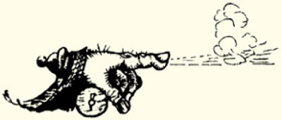
His story he told, as shivering he ran his long fingers through the mud. He had, at long last, hit the "Nickel" Jack Pot. On his way down the hill the weight of the Nickels had burst his pocket. He thought he had found about half of the Nickels but was cold.
He had a wet, limp, torn copy of the Territorial Enterprise spread over his chest under his coat—no I did not give him a drink to warm him. I gave him a copy of my paper the only newspaper you can open in a wet wind.
This is the Burro or Ass edition of this paper — and maybe this don't belong but I wanted to try some of that so-called Old Time Territorial printing BUT I GUESS I MISSED MY POINT.
This did not make the Burro edition—but I am glad to say, I have enough of this over-set stuff to make a half Ass edition.
![]()
THOUSAND PALMS
Ed Butler (Manager—when my wife's away). Station KBUN, Bemidji, Minn.
ANXIOUS READER QUERY: "THESE 1000 PALMS . . . ARE THEY DOWN . . . LIKE "SAFE AT HOME"? . . . ARE THEY UP . . . LIKE RAISING LAZARUS? . . . ARE THEY CLOSED, LIKE "KILL THE BRUTE"? . . . ARE THEY OPEN . . . LIKE "TIP, PLEASE"? ARE THEY ITCHING like the 5% BOYS? . . . OR ARE THEY READ, BY ZAZULA, HIGH PRIESTSS OF THE ASTRAL SPHERES? . . . WOULDS'T TELL? . . . BECUZ . . . 1000 IS A HELL OF A LOT OF PALMS AND A GUY CAN GET QUITE A SLAPPING AROUND IF HE DOESN'T KEN WITCH IS WITCH?
—EWB
![]()
MULISH JUSTICE
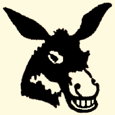
The year was 1851, the place was the little mining town of Columbia, Calif. Justice of the Peace John Sullivan was holding court. Frank Blanci had charged Manuel Lopez, a Mexican, with stealing a mule. All the evidence was in and Sullivan rendered his decision. "The defendant is fined three ounces of gold and ordered to return the mule forthwith."
Lopez, plainly worried, stepped forward. "Your Honor, I have the mule outside and I will give it back pronto. But I have no money to pay the fine."
Justice Sullivan scowled. "No money? I said gold."
"I am only a poor peon who drives horses. I have no gold."
The justice turned to Blanci. "It's your mule, isn't it?"
Blanci nodded.
"Then I fine you three ounces of gold for allowing your mule to run loose where he could be stolen. This court can't sit for nothing!"
—George Baker
![]()
I have taken your crazy newspaper for eight years. I can tell you of one notable improvement in these years, the mail man says that today he can read my address O.K. Yes, your handwriting is getting better.
—Guy Bogart, Beaumont
Only One World Famous
VALERIE JEAN
DATE SHOP
11 Miles South of Indio on Highway 99
or Please Mail Your Order
1-lb Date and Desert Confections..$1.85
1-lb. NEW "Date Crunchie" Fudge 1.85
3-lbs. 4 Varieties Rare Dates............ 3.15
Including Delivery — write for Folder
VALERIE JEAN DATE SHOP
Thermal, Calif.
DESERT RAT SCRAP BOOK 5
CREMATED CURRENCY
By John Hilton
After the white man's "sanitary laws" made the desert Indian quit his practical and sanitary custom of cremating the dead, some ceremony had to be held at the grave so in many cases a token cremation of a doll dressed as the late lamented surrounded by the most prized possessions of the deceased took place over the grave.
At one of these burnings a Chinese merchant who had done business with the well-to-do chief while he was alive, was present to pay his respects. He watched quietly while they laced articles of clothing, a saddle and many other things on the pyre but when they topped it off with a large roll of U.S. currency, then he decided things had gone too far.
Calling a couple of the principal mourners aside he explained that to burn U.S. money was a federal offense punishable by imprisonment.
"Well, what can we do?" They questioned.
The Chinaman's expression never changed. "Velly simple" he replied. "You givee money me, I countee money, give you check you burnee check. Chief cashee check in happy hunting grounds.
GENE SHERMAN'S
Mexican Coin Trick
Mr. Dana Burkhalter returned from Mexico with a bit of potable philosophy gleaned from one of the guides he hired to show him the sights. "One drink is nothing," the guide mused, leading him toward a cantina, "two drinks is half a drink, three drinks is one drink. But one drink is nothing—so we start all over." Oh, you are a devil, señor.
—L.A. Times
BURROS
The only thing I ever resented about a Burro or a Mule was that I figured that they were smarter than I was.
—Curley Stone
![]()
The burro is the biggest bird.
It wears its wings on its head.
It has two feet to walk with, two to kick with and is stubbornly backward about going forward.
Old Captain Catnip Ashby looked at this Frank Adams Cartoon—and is working on a remedy—he is going to make beer cans of compressed bran. Says they will deteriorate in our sun and the Burros will eat them. "Eureka."
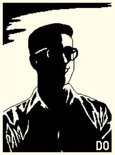
All text was hand-entered (no OCR scans) by Dick Oakes who did the layout, markup and graphics reproduction (all of Harry's misspellings retained). The contents remain the property of Bill Lincoln and his heirs.

